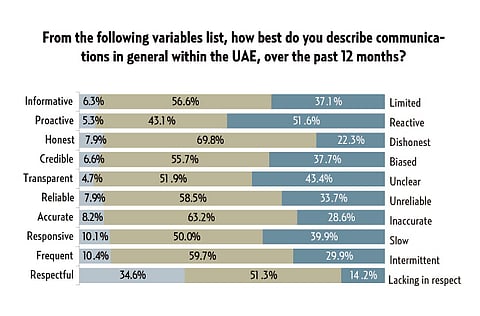Managers aim to boost talk time
Nearly two-thirds say good communication is more important since the global crisis

Dubai: One in three UAE senior business and government managers say they will boost their communications budget over the next year, says a survey released by the Middle East Public Relations Association (Mepra).
And a majority of those polled believe that a free flow of information can only help organisations improve relations with society across all levels.
When asked if communications were more critical since the global financial crisis, 63.8 per cent of those surveyed said getting the message out was "extremely important."
A further 71 per cent said better communications would "definitely improve" business, government and media.
Of a field of 367 "Are We Good Communicators" survey respondents, 318 were from the UAE and 16 per cent of those were UAE nationals, Mepra said.
"Approximately 30 per cent said they will be increasing their budget over the next 12 months," the survey said. "Less than five per cent said they will be decreasing it."
Improving effectiveness
Asked if active communications were good for reaching out to the community to forge a stronger reputation, roughly one third of respondents agreed "that communications had positively shaped the image of their organisation among employees and in public, and that communications had improved the effectiveness of their organisation."
The survey found that "When it comes to making a purchase, 70 per cent of respondents said that the reputation of a business was important."
And "88 per cent of the managers who responded placed great importance on protecting their organisation's key asset."
Lord Chadlington, keynote speaker at the recent Mepra Symposium in Dubai, said that businesses and organisations must work hard to maintain reputations.
"The essential point is that the reputation of an organisation is something that you actively have to pursue," said Chadlington, Chairman of Grayling public relations firm. "You need to decide what kind of reputation to have. How do you want that message reflected in the media."
In his keynote address, he said: "Sometimes as communicators we make the mistake of believing that better communications will get us closer to that elusive notion of ‘truth' or what is actually happening in a company, a society or an industry. Good communications, a case well put, is essentially about advocacy. It is about putting forward a point of view - and as long as that interest is clearly understood and recognized then the reader or viewer can "aim off" accordingly."
Despite attempts to push for stronger transparency, the new Mepra survey suggested that as a young country, the UAE was still sluggish when it comes to active communications.
Transparency
"When gauging the nature of communications, the UAE is generally seen as slow, reactive, unclear, biased, limited and unreliable although respectful," the survey said, noting that "it is clear that even with the overwhelming view of communications being important, it is still not widely endorsed in UAE organizations."
The survey said that 48 per cent of respondents didn't believe that communications recommendations were important over the last 12 months "in the decision making and planning process."
"Indeed, a large majority felt that accuracy and transparency of communications had not improved, and neither had frequency or quality. Few had seen the communications budget increasing."
The good news, the survey suggested, was that international reporting focused on Middle East and Dubai within the last year of difficult economic times may be leading to changes.
Of the 97 respondents who believed foreign reporting made a difference, more than "60 per cent had increased monitoring and analysis of media coverage as well as taking more time to communicate to journalists," the survey said.
Revising strategies
A further 57 per cent they "they revised their communications strategies."
When the survey asked questions specifically of senior government managers in a special section of the study, "90 per cent responded that communications was very or extremely important in their organizations and that over 60 per cent said they would be communicating more in the future."
However, when asked to rank their top three audiences, government departments scored highest at 24.1 per cent as the top audience followed by international business at 17.2 per cent and UAE residents 17.2 per cent.
Youth didn't rank.
"From the responses it seems that governments target audience is mainly internal with international business and UAE residents joint second," the survey stated. "Youth are not regarded as a key audience for this sample group."



